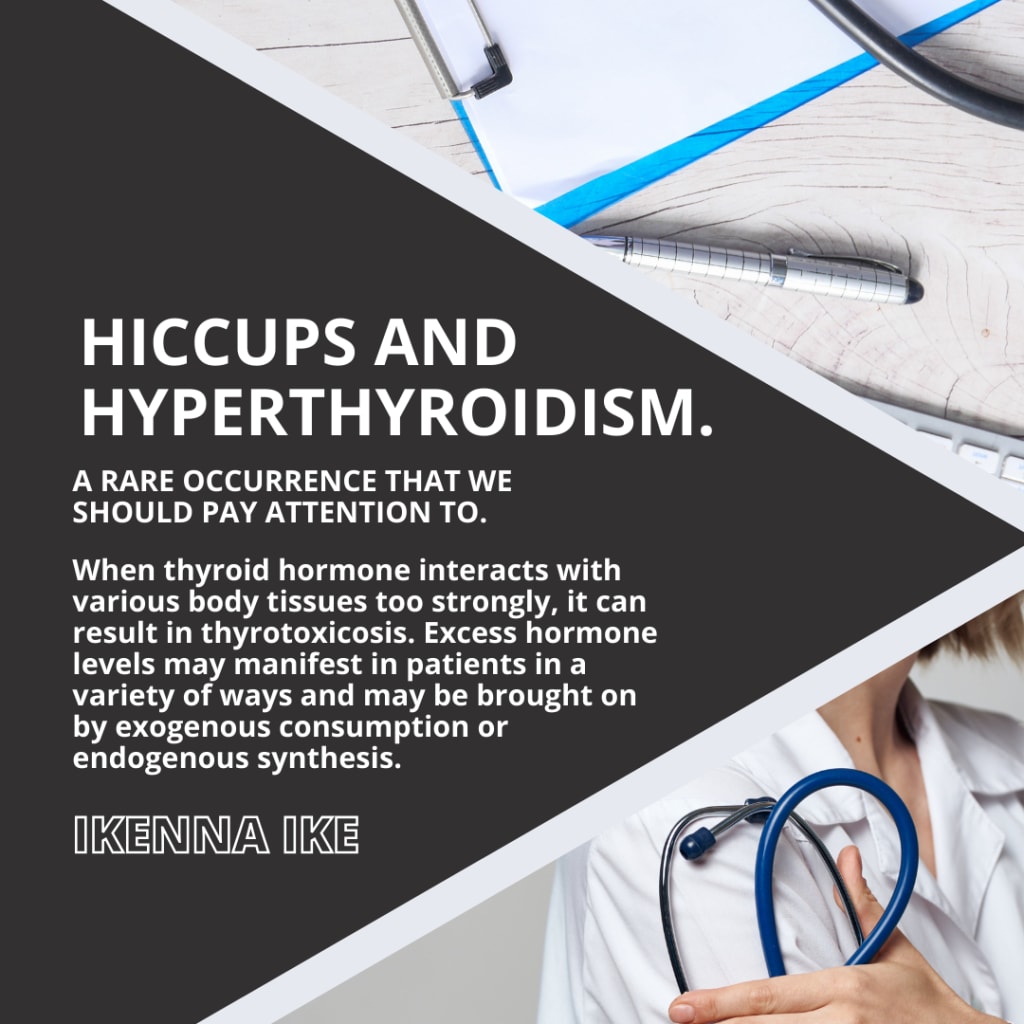Ikenna Ike- Hiccups and hyperthyroidism.
A rare occurrence that we should pay attention to.

When thyroid hormone interacts with various body tissues too strongly, it can result in thyrotoxicosis. Excess hormone levels may manifest in patients in a variety of ways and may be brought on by exogenous consumption or endogenous synthesis. Chronic hiccups may come from high thyroxine levels irritating the neuroanatomical hiccup center. Clinicians should be aware of this disorder despite being relatively uncommon in order to correctly diagnose and treat patients.
When hiccups last for more than 48 hours are classified as intractable, also taking into account if the patient is exhibiting significant distress or discomfort. Finding the cause and then taking the proper action are the first steps in treating hiccups. When a patient complains of having hiccups, other unusual illnesses such metabolic syndromes should be taken into consideration, even if stomach distention and consuming alcohol are common causes of them.
Here's an example of this phenomenon. One week after having an epidural steroid injection to the back, a 50-year-old African American man with a history of smoking, work-related acute back pain treated with physical therapy, and persistent hiccups went to the emergency room complaining about them. He claimed that his hiccups, which he claimed were getting worse over time, were interfering with his regular duties. His use of chlorpromazine and over-the-counter antacids has not resulted in any appreciable improvement. There were no stomach aches, nausea, vomiting, or abdominal distention in addition to the hiccups. Additionally, there was no prior history of using medication for symptoms related to these disorders, such as shaking, anxiety, agitation, diarrhea, or any other related symptoms.
The patient, who had a body mass index of 30.17 kg/m2, appeared unwell, was in discomfort, and was confused during the test. The patient's vital signs were tachycardia, a broad pulse, 157/61 mm Hg blood pressure, 15 breaths per minute respiratory rate, and a temperature of 98.1°F. It was audible across his entire thyroid gland, which was big, mushy, and dispersed. Despite bilateral proptosis, his eye exam revealed no signs of ophthalmopathy.
There were no obvious symptoms of congestive heart failure or audible cardiac murmurs, and the neurological test findings weren't particularly intriguing. Hemoglobin and platelet levels were normal, and there was a little leukocytosis of 13.8 103/uL, according to the test results. A total of 3.1 mmol/L of mild hypokalemia and 264 u/L of isolated elevated alkaline phosphatase were found by the metabolic panel. The findings of various tests, including those for troponin, B-type natriuretic peptide, kidney, liver, calcium, magnesium, and function, were all within normal limits.
The echocardiography revealed no abnormalities, while the ECG displayed sinus tachycardia. Imaging tests including chest radiography and head, chest, abdominal, and pelvis computed tomography scans revealed nothing unusual. A thyroid function test showed increased levels of free T4 >24 and free T3 >32, as well as very low thyroid-stimulating hormone at less than 0.01 uIU/mL in the results. The thyroid glands seemed big and hypervascular on a thyroid ultrasonography. Thyroid peroxidase antibodies also rose to a level of 37 IU/mL.
Due to the patient's 20 points on the Burch-Wartofsky point scale, the patient was admitted to the medical floor and treated as a case of thyrotoxicosis without approaching thyroid storm. After the frequency and severity of the hiccups decreased during the hospital stay, the patient was released from the hospital with a follow-up visit in the outpatient clinic scheduled for a second thyroid function test in two weeks.
The main cause of thyrotoxicosis is too much thyroid hormone. Overproducing T3 and T4 as well as taking synthetic thyroid hormone are examples of endogenous sources of the hormone. Thyroid hormone, a necessary hormone, can boost alpha-adrenergic receptors, which in turn elevates sympathetic activity, directly affecting tissue thermogenesis and basal metabolic rate.
Heat sensitivity, palpitations, anxiety, fatigue, weight loss, muscle weakness, and irregular menstrual cycles in women are just a few of the many indications and symptoms of thyrotoxicosis. Clinical symptoms include, among others, tremor, tachycardia, lid lag, and warm, wet skin. Subclinical hyperthyroidism typically exhibits vague and nonspecific signs and symptoms. Hiccups are one of the exceedingly uncommon symptoms of thyrotoxicosis and hyperthyroidism. Only a few occasions have case reports identified hiccups as the illness' initial symptom.
Hiccups are a rare gastrointestinal sign of thyrotoxicosis, but they could nevertheless be the first to appear. These people can develop chronic persistent hiccups, which are probably brought on by the hiccup center being aggravated by high thyroxine levels. A thorough differential diagnosis should be performed on anyone who has recurring hiccups because the mode of treatment depends on the underlying reason. In order to treat these patients effectively, doctors should broaden their differential diagnosis to encompass a number of endocrine diseases because detecting and treating hiccups can be difficult in clinical practice.
About the Creator
Ikenna Ike
Hello, I am a fun person and I like to write about various topics that I am passionate about, such as sports such as basketball, American football, and other topics such as music or news.






Comments (1)
Very good to know! Hiccups are linked to a lot! Great work